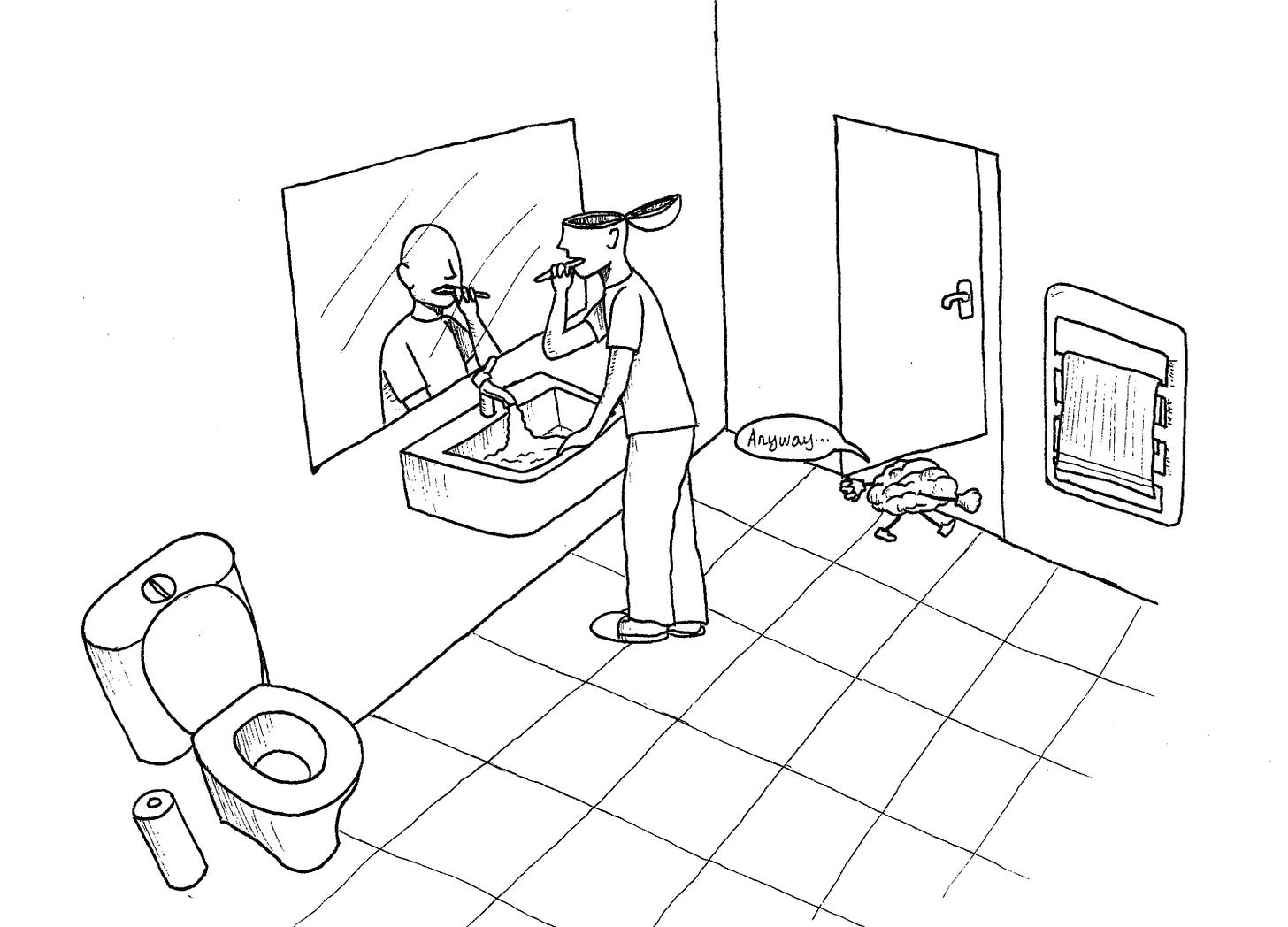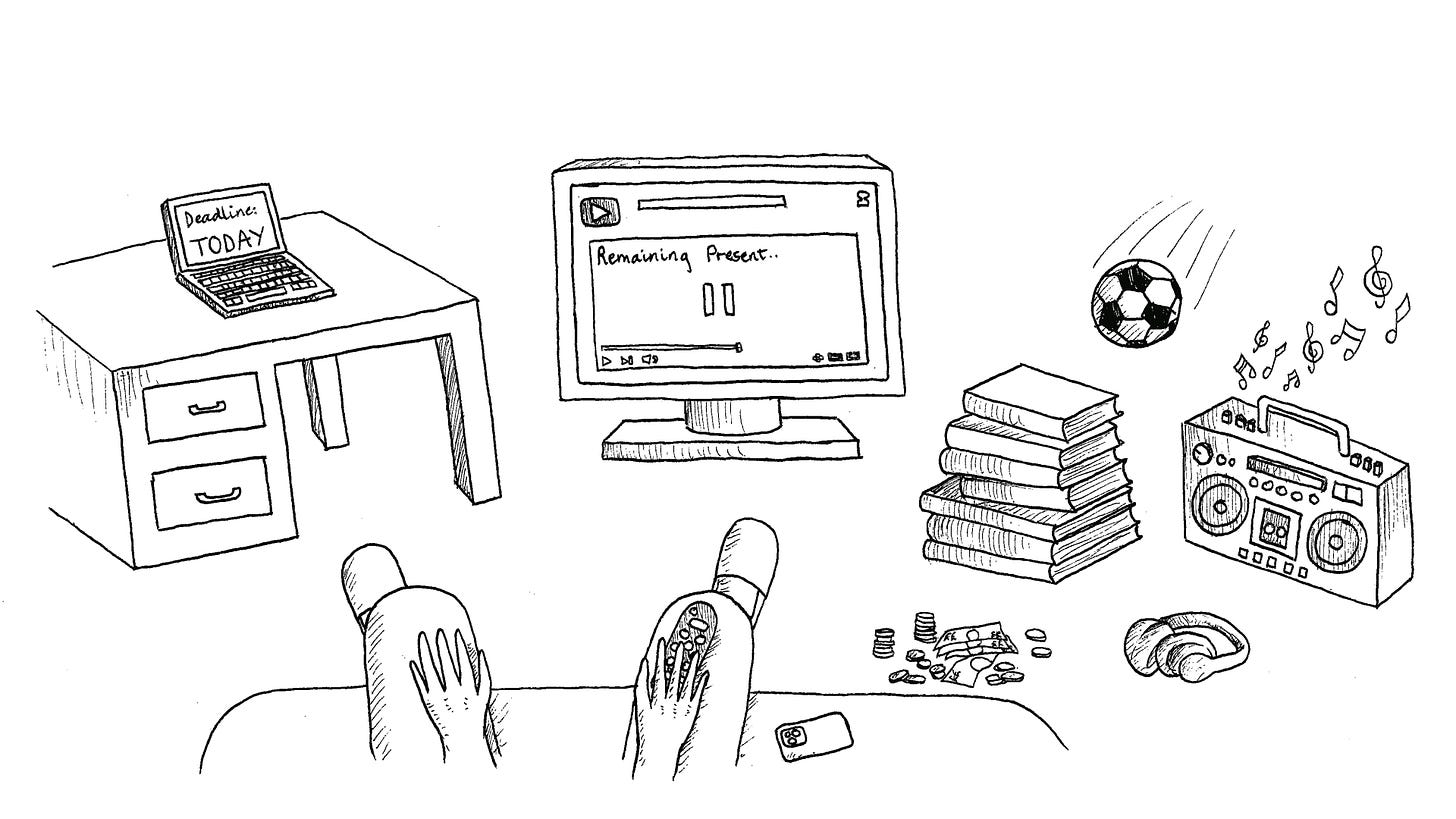Taming the Internal Chaos: Calming a Racing Mind in Busy World
Practical tips on focus, bedtime routine, and mental clarity
Prelude
On the outside I’m brushing my teeth…
in reality the responsibility has fallen on muscle memory and the inside has gone into autopilot.
Sound familiar?
For me, it goes something like this:
I forgot to put bagel on my list, twice… wait. I bought that, but I forgot - I remember when I used to eat - How did I forget to - It’s been a while since I’ve heard from…’
You get the gist. It’s like pigeons fighting over bread and next thing I know, toothpaste has gone on my clothes.
When a racing mind hinders, it’s like a wannabe Shiny Object Syndrome but sometimes it can produce moments of brilliance; connecting and perfectly aligning the dots between our thoughts.
The pantomime continues when I go to bed, where my thoughts can keep me up for hours.
If I told you I’ve written poems and created detailed plans for many of my posts on The Thought Base as a result of that, would you believe me?
Ironically, this post is a product of the internal chaos between brushing my teeth and going to bed.
To be fair, after posting about stress for almost 2 months, I felt as if we needed something more light-hearted on The Thought Base.
In this thought piece, we explore what a racing mind is, ways to calm it, and the importance of a routine.

Discussion
When looking into the definition of a racing mind (aka. racing thoughts), there were a variety of viewpoints which made me question if I know what it really means.
For the more broad and holistic definition, it reaffirmed the fast-moving flow of thoughts I had described earlier.
But when seeking a more detailed definition, the viewpoints became overly negative and were discussed in conjunction with health conditions with which it is linked.
It got dark quickly.
I’ll give an example which felt like a political diatribe and got me nodding my head slowly with raised eyebrows:
“They are strings of thoughts that are blown out of proportion, have a pattern, consume time, and often have no rational conclusion.”
What I did find interesting was that apart from stress potentially being a cause of the racing mind, there were parallels in the variability of its definitions.
But I didn’t want to conclude on the fact that the racing mind is a personal experience as I had an inkling that there is something deeper.
Mindfulness and a Racing Mind: Maintaining a calm mind in the day and night
When experiencing a racing mind at night, that is when I find it to be most damaging.
I literally cannot ‘switch off’ sometimes and next thing I know, it’s 3am.
During the day it’s more manageable; step 1: intentionally slow down, step 2: disengage your mind….
step 3: think about tomorrow.
Don’t Try not to do that.
The aim for me is to stay as present as possible.
I find just repeating what we can control is the best way to stay present.
Sometimes, that is washing the dishes after you have been avoiding them all day.
The only thing we can control is what we do now.
After a few attempts of step 1 and 2, the final step is to be present and appreciate the current moment.
That looks different depending on the context.
For example, when in a lecture it could be remembering why you turned up and what you want to achieve in that 1-2 hours.
On the other hand, you could find yourself being more anxious and unintentionally distracted when ‘resting’ and the resting is scrolling social media for a ‘break’ from life.
But even when you’re watching a show, series, YouTube - the inability to remain present will invite stressors from the past and the future to spoil the enjoyment you should be having and it’s even worse when you believe you are actually resting.
Your mind feels heavy, you feel uninspired, and it is almost as if you were working your mind just as you were before taking a break.

During the day, that is the worst I get from having a racing mind.
At night though I’ll like to start by highlighting that we have many contradictions when it comes to organisation.
Personally, I have a morning routine, but not a consistent bedtime one.
I plan the first half of the day to a tee, but the second half is flexible and sometimes is whatever.
As a result, I find that I gain the satisfaction from remaining disciplined and sticking to my plan in the first half of the day, and in the second half I get that second wind - feeling energised and motivated to do more.
Now, I’m not saying I plan every hour.
That’s even more stressful.
If anything, I like the spontaneity amongst the singular time block I would have in the evening.
The issue is the lead up before bed.
Every time I hear no screen 2-3 hours before bed I chuckle.
That is where work is done and entertainment is consumed.
With the awareness however, I can say I’ve made some tweaks little by little.
For a long time the bedtime routine was just brushing my teeth and using mouthwash, but the routine starts hours before.
Just before bed, (and I need to do more of this) breathwork is a great way to relax the mind and body, which is something I initially applied as a post-home workout routine.
Back in 2021, I sporadically engaged with it.
As a heads up, this is not intended to be a substitute for professional medical advice, diagnosis, or treatment.
If you would like to test it out, here is what I do:
15 seconds of short and sharp breaths through the nose
45 seconds - Hold breath
Inhale again through the nose without exhaling and hold for 10 seconds
— After one round of this, repeat twice again when you’re breathing as you usually do at rest.
This technique was introduced to me as the ‘Breath of Fire’ and I’ve found it to calm both the mind and body.
One thing I want to reiterate is that I came across this as a post-workout routine and I engaged with it on the premise that nose breathing can significantly increase oxygen intake.
This fascinated me at the time as breathing is unconscious until you take note of it, and for the most part I would have assumed breathing through the nose is a natural pathway.
As a result, I didn’t see the benefits you would find with a quick search today.
If you were to skim read a few articles today, here a few benefits you may come across that I can vouch for:
Improves respiratory function
Better mental clarity
Enhanced concentration
The most important benefit for me was the aid it provided in staying present, hence why I incorporated it as part of my bedtime routine.
Alongside this, it is not as time consuming as meditation which is something that incorporates the benefits listed above.
However, as highlighted by JustHealthy, it may not be a suitable technique for everyone and it specifically should not be performed by:
Pregnant women,
People with hypertension
people with respiratory or cardiovascular conditions
Furthermore, if you feel dizzy or uncomfortable, it is important to listen to your body.
There are an array of techniques available that can help you take a step back from the pressures of day-to-day life.
As I said before though, a racing mind for me isn’t all bad.
In amongst the familiar and predictable routine, there may be moments of organised chaos when an idea arises.
Therefore, the goal isn’t to eradicate my thoughts but to relieve my mind at appropriate times.
When it gets to a point where my mind is keeping me awake, my approach is to take note of whatever the thought is on my phone or ignore it if it is insignificant.
I’ll rather trade off blue light than a racing mind and regret when I can’t remember the thought.
(Sleep scientists and productivity gurus about to implode).
Is there any resolution?
In the midst of a racing mind, I released a stream of consciousness through the following thought:
‘Streamline the end of your day so there’s not much to think or worry about. Don’t underestimate the power of a mind at peace. We take it for granted when things just go smoothly, and when they don’t it feels like the world is against us. Create that simplistic and perhaps mundane wind-down routine. Even when the day just ended resurfaces in your mind or you start thinking 20 years ahead, you wouldn’t be irritated from being derailed from what you wanted to do. Sometimes there are moments of brilliance in these thoughts.’
When reading back on this thought, I realised that a racing mind is like a mediocre employee.
It gets the job done, but in the long-term it doesn’t help you progress.
The job in this case is this the post. This post is literally a by-product of a racing mind.
So is there any resolution?
The fact I think of an array of considerations, plans of action, and also reflect, helps me to plan ahead and trust there are no gaps between them.
It’s like an unsolicited brainstorm.
Don’t get me wrong, it can get frustrating, but as with anything, it is bigger than black and white.
I’m going to continue working on my bedtime routine.
What is the next plan of action for you?
P.S.
Do you have a bedtime routine?
What are barriers to meditation and breathwork?


Malick - This post is both refreshingly honest and deeply relatable. That image of “pigeons fighting over bread” nails the racing mind perfectly and I appreciate how you balance humor with practical wisdom.
Your reflections on breathwork, bedtime rituals and the illusion of “placebo resting” are spot on. It’s not about silencing the mind but learning how to meet it with our caring presence. Thanks for sharing your practice-in-progress so openly as it makes me feel a little less alone.
"This technique was introduced to me as the ‘Breath of Fire’ and I’ve found it to calm both the mind and body."
Breath of fire makes it sound so cool! I'm adopting that terminology! Breathing--so simple yet so hard!!! Thanks for the article.